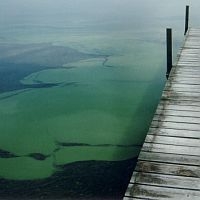
(Host) A new study warns that climate change will aggravate Lake Champlain’s pollution problems.
The report for The Nature Conservancy says the lake’s levels are higher because of increased precipitation. And the researchers say the wetter weather may cause more phosphorus pollution to wash off the land and harm the big lake.
VPR’s John Dillon has more:
(Dillon) The study for the Adirondack and Vermont chapters of The Nature Conservancy is one of the first to forecast the impacts of climate change on a local scale.
Curt Stager of Paul Smith’s College in the northern Adirondacks did much of the research. Stager specializes in aquatic ecology and climate change. He used decades of historical weather data coupled with new computer tools to look at the effects of a warmer world on Lake Champlain’s 8,000-square-mile watershed.
He says one major change is that the lake often fails to freeze over in the winter as it used to.
(Stager) "That’s one of the biggest, most obvious signs that this warming trend really has been happening in recent decades. A lot of times climate change seems like an abstract thing that happens to polar bears or something and doesn’t affect us here, and a lot of people are rightly skeptical as to what does global climate change mean to us living here on the ground. But this ice cover thing is something you’ll see in your daily life."
(Dillon) The Champlain basin is also getting wetter as the climate gets warmer. The average lake level is about a foot higher than it was in the 1970s.
Stager says most climate models predict more precipitation in the Lake Champlain basin – and that means more phosphorus pollution in the big lake. Phosphorus acts as a fertilizer for the toxic algae blooms that have choked the lake’s shallow bays in recent years.
(Stager) "The more you would increase precipitation the more likely you are to have runoff and erosion and that would be one of the main sources of phosphorus into the lake and the tributaries. So wetter conditions would mean more pollution getting into these places and then in terms of temperature what it’s most likely to do is make it more sensitive to the effects of the phosphorus."
(Dillon) Rose Paul is an ecologist with the Vermont chapter of the Nature Conservancy. She says that the lake is stratified by temperature zones, with cold oxygen-rich water capped by a warmer layer near the surface. The study predicts that the surface water will stay warmer longer, which will make life a little harder for cold-water fish.
(Paul) "There is likely to be less of a deep cold water area for the kind of species that need cold, well-oxygenated water, so their habitat in the warm summer months simply shrinks. So species like lake trout and burbot – they’re going to get more crowded in to the deep, cold water part of the lake."
(Dillon) But the experts say the study isn’t all doom and gloom. Here’s Curt Stager.
(Stager) "It’s a mix of good news and bad news in a way. The bad news is that climate change is likely to amplify some of our existing environmental problems. And the good news is that you don’t have to reinvent the wheel to deal with that. They’re familiar problems that we’re already trying to deal with. So we just need to do more of that and do a better job with it."
(Dillon) The study says the state must strengthen management techniques such as shoreline buffers that control erosion and reduce phosphorus pollution.
For VPR News, I’m John Dillon in Montpelier.